Raisi's Tough Reaction To Biden Saying 'We Will Free Iran'
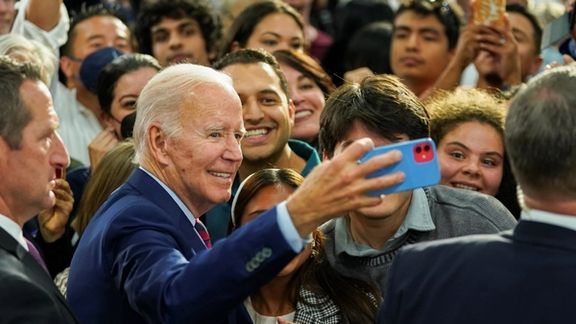
US President Joe Biden on Thursday vowed to "free" Iran and said that protesters who oppose the Islamic Republic would soon succeed in freeing themselves.

US President Joe Biden on Thursday vowed to "free" Iran and said that protesters who oppose the Islamic Republic would soon succeed in freeing themselves.
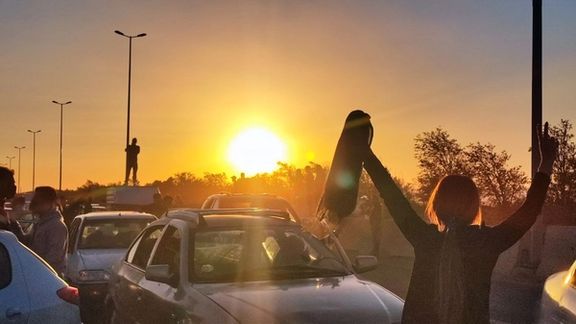
From early morning Thursday [Nov. 3] turned out to be another phase of Iran protests with several memorial gatherings met with government violence and escalation.
The antigovernment uprising has entered the phase of people mourning those killed in September and October, with Iranians gathering to vent their anger on the 40th day of those killed by security forces.
According to tradition, the 7th and 40th days of people's death are solemn occasions to gather and commemorate their memory. When the departed are victims of injustice, the occasion becomes a more emotional one.
There were these sort of protests in almost ten cities daytime Thursday with more demonstrations expected in the evening.
This is what is taking place almost on daily basis in Iran. While security forces instead of standing aside and allowing these gatherings to turn into protests in cemeteries, they intervene, attack and arrest people, fire their guns and add to the tension.
During these clashes sometimes more people get killed and this fuels a new cycle of protests in the coming days and weeks.
On Thursday citizens of Karaj and Arak held rallies to honor the memory of Hadis Najafi and Mehrshad Shahidi, two young protesters killed by security forces 40 days ago and seven days ago, respectively.
They fired guns and arrested many young people, which will simply intensify the protests.
Below we offered live coverage of events in Iran on November 3. Our coverage ended at 02:00 hour Iran time
----------------------------------------------------------------------------------------------------------------------------
Confrontation in Fuladshahr in Esfahan Province. Two riot police seen on the ground, as they lost consciousness on Thursday.
-----------------------------------------------------------------------------------------------------------------------------
----------------------------------------------------------------------------------------------------------------------------
In Rasht, northern Iran, protesters force the police to retreat through the streets.
----------------------------------------------------------------------------------------------------------------------------
Scattered protesters in Bijar, Kordestan province chanting "death to Khamenei" Thursday night.
----------------------------------------------------------------------------------------------------------------------------
Protests in the eastern Tehran district of Narmak. People chanting against Khamenei for "year of crimes".
----------------------------------------------------------------------------------------------------------------------------
Young protesters marching in central Tehran and chanting, "This year is the year of blood, Seyyed Ali will be gone," referring to Ali Khamenei.
----------------------------------------------------------------------------------------------------------------------------
Another scene from protests in Qazvin, Thursday night.
-----------------------------------------------------------------------------------------------------------------------------
The evening, night time protests well underway in Tehran. Here is crowd in Saadat-Abad district of Tehran.
----------------------------------------------------------------------------------------------------------------------------
People set fire to a large banner of Qasem Soleimani in Qazvin Thursday night. Soleimani was killed in a drone attack in January 2020 in Baghdad ordered by former US President Donald Trump.
----------------------------------------------------------------------------------------------------------------------------
Security forces lined up in Tabriz ready to attack protesters.
----------------------------------------------------------------------------------------------------------------------------
Crowds are getting larger in the working class neighborhood of Naziabad in Tehran Thursday evening. In this video no security forces can be seen.
People beginning to congregate also in Tehran-Pars district.
----------------------------------------------------------------------------------------------------------------------------
For the first time in 43 years people in the city of Fasa, Fars Province, came out to protest Thursday evening.
----------------------------------------------------------------------------------------------------------------------------
In the evening, people in the streets of Bukan, western Iran chant "Death to the dictator."
----------------------------------------------------------------------------------------------------------------------------
A large crowd in Karaj, 20 miles west of Tehran, blocked a major highway during ceremonies honoring the memory of Hadis Najafi. Protesters were chanting, "This year is the year of blood, Seyyed Ali will be gone", referring to Iran's ruler Ali Khamenei.
After security forces fired at protesters, people set fire to a police van in Karaj.
----------------------------------------------------------------------------------------------------------------------------
A large crowd gathered in Esfahan on Thursday to commemorate the 40th day of Mahsa Mogui, a young protester killed in September. They were chanting, "I will the one who killed my sister."
In Fuladshahr, near Esfahan, security forces shot a woman in the head. Her children who were next to her are screaming in the video clip.
-----------------------------------------------------------------------------------------------------------------------------
In Kermanshah, western Iran people commemorated the 40th day of Saeed Mohammadi killing by security forces. They chanted, "Death to the dictator".
-----------------------------------------------------------------------------------------------------------------------------
In Qazvin thousands turned out to honor the memory of Javad Haydari. They were chanting, "IRGC, Basij goons, you are our ISIS", referring to the Sunni Muslim terror group.
-----------------------------------------------------------------------------------------------------------------------------
The 40th day commemoration of a young man, Behnam Layeqpur, in Rasht, northern Iran. People repeating "Death to the dictator".
-----------------------------------------------------------------------------------------------------------------------------

An Australian lawmaker has shown solidarity with Iranians in their fight against clerical rule, saying that the Islamic Republic will face the consequences of mistreating protesters.
Keith Wolahan, a member of Australia’s House of Representatives said in an exclusive interview with Iran International that he will do whatever he can to make the voice of the Iranian community heard.
“The least I can do is to stand there with them and use my voice as their representative to help in any way I can,” noted the Australian official.
The Australian politician read a statement in the house of representative on the fortieth day after the killing of Mahsa Amini to declare solidarity with the people of Iran.
“It's not acceptable and it's not good enough that the regime has a seat on the UN Commission for the Status of Women. It's also not good enough that the officials of the regime can travel freely around the world without consequence when they're trampling on freedoms at home,” Wolahan noted about the goal behind his statement.
“Many of the protesters are not only being killed but are now going to be subject to what can only be described as show trials…There will be consequences for how those people are treated,” he warned.
Wolahan represents the division of Menzies where the largest population of Iranian people are living in Australia.
“I want to make sure that that voice is heard by the prime minister and the foreign minister. Even though I'm not in their party, I plead with them to please listen to the concerns of the community and to act in the way that Canada, the United States and Germany did,” underlined the Australian MP.

Amid daily antigovernment protests across Iran, Germany's government on Thursday urged its citizens to leave the country or risk arbitrary arrest and long prison terms there.
Warning that dual nationals who have Iranian as well as German citizenship were particularly at risk, Germany's Federal Foreign Office said in a statement that “For German nationals there is a concrete risk of being arbitrarily arrested, interrogated and sentenced to long prison terms.”
The German embassy in Tehran is also evacuating the families of its personnel and the teachers of German-run schools, Iran International has learnt.
Berlin has welcomed European Union’s sanctions on the Islamic Republic, which has unleashed a bloody crackdown on some of the biggest protests across the country since the 1979 revolution.
As Tehran-Berlin ties are getting more and more sour, Germany summoned last week the Iranian ambassador Mahmoud Farazandeh for talks. This followed Iran summoning German ambassador Hand-Udo Muzel, when Iranian Deputy Foreign Minister Ali Bagheri Kaani criticized Berlin for provoking “rioting and law-breaking in Iran” contrary to international law.
Foreign Minister Annalena Baerbock said on October 26 that Germany is mulling over more restrictions for entry of individuals affiliated with the Islamic Republic beyond an already announced EU sanctions package over Tehran’s human rights violations.
Also on Thursday, opposition member of German parliament Johann Wadephul told The National that “The response so far at German and European level has been too half-hearted to put the regime in Tehran under pressure,” urging Berlin to tighten the screw on the Iranian regime.
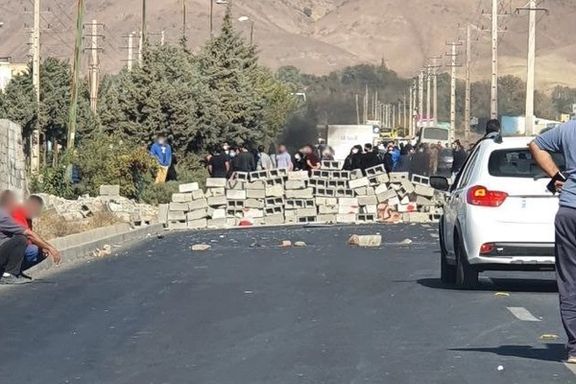
Protests rage in Iran Thursday with cities of Arak and Karaj scenes of clashes as regime’s forces opened fire at mourning ceremonies of two dead protesters.
Citizens of Karaj and Arak held rallies on Thursday to honor the memory of Hadis Najafi and Mehrshad Shahidi, two young protesters killed by the security forces 40 days ago and seven days ago, respectively.
The 40th day of a loved one’s death – as well as the seventh day -- have a special significance in Iran, and in case of an unjust killing, such as the young protesters who were killed by the agents of the Islamic Republic, the occasion turns into public mourning and fuels angry protests.
Videos obtained by Iran International show a huge crowd of people flocking to Behesht-e Sakineh cemetery in Karaj, west of Tehran, to attend the mourning ceremonies to honor protesters Hadis Najafi and Parsa Rezadoust.
The security forces blocked the roads to the graveyard and fired teargas at the bereaved families as well as other people who wanted to reach the cemetery, arresting many. Outraged protesters then blocked the highway out of the graveyard with stones and concrete blocks, chanting "Death to Khamenei."
In Arak, a huge number of people held a protest rally, chanting "Death to This Leadership" during the ceremony to mark the seventh day after the death in custody of Mehrshad Shahidi, a 20-year-old chef who was beaten to death with batons.
Holding gatherings for funeral services and 40th day or seventh day ceremonies pose a challenge to the regime because the more it cracks down and kills people, the more protests follow, leading to a vicious cycle.
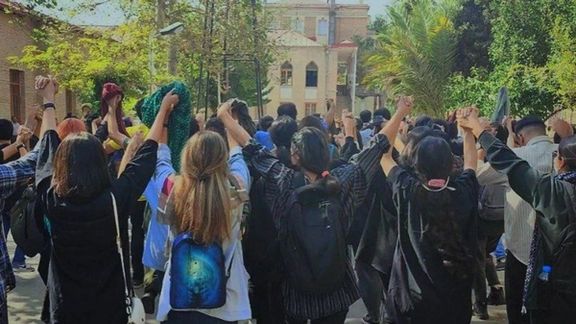
The following feature article is a full re-print from Reuters on protests in Iran.
-----------------------------------------------------------------------------------------------------------------------------
As a child in Iran, Shideh heard her parents warn her older siblings against taking part in anti-government demonstrations because of the bloody crackdown that would follow. But today, with protests raging across Iran, things have changed.
Both Shideh - now a teenager - and her mother say they have joined seven weeks of demonstrations ignited by the death of a 22-year-old woman, Mahsa Amini, in the custody of Iran's morality police.
The protests triggered by Amini's death on Sept. 16 have shown the defiance of many young Iranians in challenging the clerical leadership, overcoming fear that has stifled dissent in the wake of the 1979 Islamic Revolution.
"I have one life and I want to live it freely," said Shideh, 17, who asked that her family name not be used. "We are not scared of being killed. We will eventually change the regime."
Her sentiment was echoed by a dozen young Iranians from across the country interviewed by Reuters by phone. The students, who asked not to be named, said the protests reflect what many young Iranians see as a darkening future for a country ruled by hardliners seeking to tighten rigid social controls.
Iranian officials, who have blamed Amini's death on preexisting medical problems, say the unrest has been fomented by foreign enemies including the United States, and accuse armed separatists of perpetrating violence.
Iran's interior ministry and chief of police's office did not immediately respond to a request for comment for this story.
The authorities have used tried-and-tested means of quelling dissent - from tear gas and bullets to intimidation and arrests - many young demonstrators have remained unbowed.
"Shoot us! We are not afraid anymore," shouted a small group of young women kneeling without their headscarves in front of riot policemen in Tehran last week, in one video shared on social media.
More than two-thirds of Iran's 85 million people are under the age of 30. Even if the latest protests subside, the fearlessness of young Iranians could spell more trouble ahead for the establishment, according to rights activists, analysts and one former moderate official, who spoke to Reuters on condition of anonymity.
The power wielded by Iran's security apparatus still looms large: Shideh and her mother declined to be identified for safety reasons, and also requested their location in Iran not be disclosed.
But for Shideh's mother, the death of Amini - who was arrested for "inappropriate attire" - marked a turning point.
It "changed everything", she said.

Too frightened to oppose Iran's ruling clerics for years, she has joined thousands of women at the forefront of protests that have turned into a revolt against what demonstrators describe as increasing authoritarianism.
"I cried for days for Mahsa. My Shideh could be arrested by the morality police and killed like Mahsa. That thought hit me hard," said her mother, speaking from her home in central Iran.
"As a mother, I feel I should stay on the streets and reclaim Iran for my daughter, for all Iranian girls."
SYMBOL OF GRIEVANCES
Amini's death has become a symbol for many of the manifold grievances in Iranian society, galvanising some protesters to demand the downfall of the Islamic Republic.
As a young woman, her death sparked anger among Iranians who do not want their daughters arrested because of how they dress. As a Kurd, her death touched on long-standing minority grievances in Iran, a mosaic of ethnic and religious groups that say they have long faced discrimination by Tehran.
Experts on Iran say the clerical establishment's staying power has been underpinned since the 1979 revolution by its willingness to use whatever force is necessary to silence dissent.
But "fear has a limit, like repression", said Saied Golkar, an Assistant Professor of political science at the University of Tennessee at Chattanooga.
"There is a turning point when repression and fear don't work anymore: when people realize they have power when they act collectively and when they fear the gloomy future more than the regime," he said.
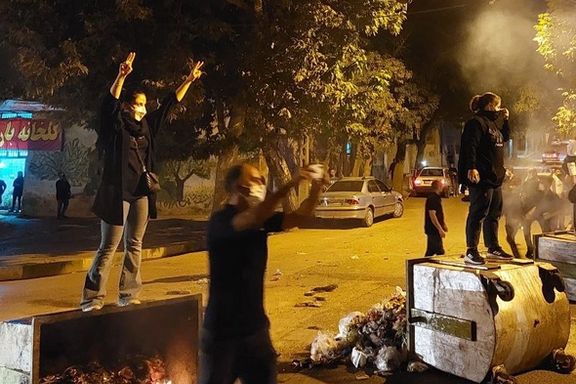
For the first time, schoolgirls have taken into streets, along with thousands of Iranians from all walks of life, including ethnic minorities.
"It's a revolution to end years of discrimination. We will not remain silent," said Ziba, 15, who has been protesting in Iran's Kurdish region. "We want freedom for all Iranians, from Baluchis to Kurds and Turks."
BREAKING TABOOS
Security forces have fiercely confronted the protesters, killing at least 300 of them - including 45 minors - wounding hundreds and arresting thousands, according to rights groups.
Iranian authorities have denied children were killed during the unrest.
Security forces have raided several schools across the country, detaining schoolgirls, according to videos posted on social media, which Reuters was unable to verify. They fired teargas outside a Tehran school after a clash between staff, students and parents when the principal insisted on checking girls' phones, according to the one of the videos.
Other social media images have shown schoolgirls tearing up pictures of Supreme Leader Ayatollah Ali Khamenei and the late founder of the 1979 Islamic revolution Ayatollah Ruhollah Khomeini, burning their veils and knocking clerics' turbans from their heads in the streets.
Such taboo-breaking moments reflect a widening gap between Iran's clerical leadership and a young population, analysts say. Many young Iranians have long called for the lifting of social restrictions, such as internet censorship and strict dress codes.
The dozen schoolgirls and university students from across Iran interviewed by Reuters - drawn from different ethnic groups and backgrounds - expressed hope the protests could be a turning point.
"They can kill us. They can arrest us. But it is the start of their end," said Farzaneh, 16, in a southern Iranian city. "Maybe today. Maybe next week or next month. But our revolt is irreversible."
However, Sanam Vakil, deputy director at the Royal Institute of International Affairs, said she still expected to see a robust pushback by Iran's security forces, involving "more violence and intimidation and fear".
Iran's most widely feared force, the Revolutionary Guards - a hardline military force used by the state to crush political unrest - have yet to be deployed to quell the protests but its top commander warned demonstrators on Saturday to get off the streets.
"PUSHING FOR CHANGE"
Yet unrest among university students, who played a major role in toppling the U.S.-backed shah in 1979, is far from dying down, with protests persisting at over 130 universities.
With student numbers swelling in Iran's young population, such signs of growing dissent cannot be easily ignored by the authorities, a former moderate official said.
"These protests will end eventually but wounds will remain and rifts will deepen. We should be worried about future protests," he said.
With deepening economic misery, largely because of U.S. sanctions over Tehran's disputed nuclear work, many young people are feeling the pain of galloping inflation and rising joblessness.
Inflation has soared to over 50%, the highest level in decades. Youth unemployment remains high with some 50% of Iranians being pushed below the poverty line, according to reports by Iran's Statistics Center.
By defying state warnings to end protests, students have paid a heavy price. Security forces have raided university campuses, arrested hundreds of students and injured many more, according to witnesses, social media videos and rights groups.
"We're angry over years of repression, over a dark future," said a student at Tehran's Sharif university, where security forces used teargas and pellet guns to disperse students repeatedly. "We want freedom. We want a future."
Ali Fatholla-Nejad, an Iran expert with American University of Beirut, said the clerical rulers were themselves being engulfed by a "revolutionary process" and would likely face more unrest in the future.
"If the current uprising is fully repressed, the next eruption of popular anger may also be a question of time," Fatholla-Nejad said.
"Don't worry, we're gonna free Iran. They’re gonna free themselves pretty soon," Biden said during a wide-ranging campaign speech in California, as dozens of demonstrators gathered outside holding banners supporting Iranian protesters.
Biden did not expand on his remarks or specify what additional actions he would take during the remarks at MiraCosta College near San Diego.
Iran’s President Ebrahim Raisi reacted on Friday during a pro-government rally on the anniversary of the occupation of the US embassy in Tehran in November 1979 that resulted in taking dozens of Americans hostage for 444 days. In harsh anti-US remarks, Raisi said that he came across Biden’s statement “that he might have uttered in a state of wackiness.”
Raisi responded to Biden’s remark saying that “He said standing behind the official podium that they are supposed to free Iran. Mr. President, Iran was freed 43 years ago and vowed not to be enslaved by you.”
Raisi went on to mock US attempts to block Iran’s oil exports, saying that Washington’s plans were defeated. “Today we have influence in the region and no equation can succeed without Iran’s agreement, and America also knows this very well.”
The White House's National Security Council did not immediately respond to a request for comment.
Iranian Americans opposed to the clerical regime in Tehran have viewed the Biden Administration as weak and ready to make deals with Tehran. Before his election in 2020, Biden announced that he would seek to restore the 2015 nuclear deal, known as JCPOA, that his predecessor had abandoned.
Eighteen months of negotiations before the current upheaval started in September failed to produce a result, and Iran even began supplying drones to Russia to use in Ukraine, the administration has said.
Seven weeks of demonstrations in Iran were ignited by the death of a 22-year-old woman, Mahsa Amini, in the custody of Iran's morality police.
The protests triggered by Amini's death on September16 have shown the defiance of many young Iranians in challenging the clerical dictatorship, overcoming fear that has stifled dissent in the wake of the 1979 Islamic Revolution.
Demonstration on Thursday in many cities once again shocked the clerical regime which does not know how to end the nationwide protests that have become a daily occurrence. Its security forces cannot be everywhere at all times and protesters rejecting the whole political system are becoming bolder, attacking police, anti-riot forces and government vigilantes called Basij.
The United States on Wednesday said it will try to remove Iran from the 45-member U.N. Commission on the Status of Women (CSW) over the government's denial of women's rights and brutal crackdown on protests.
Iran is just starting a four-year term on the commission, which meets annually every March and aims to promote gender equality and the empowerment of women.